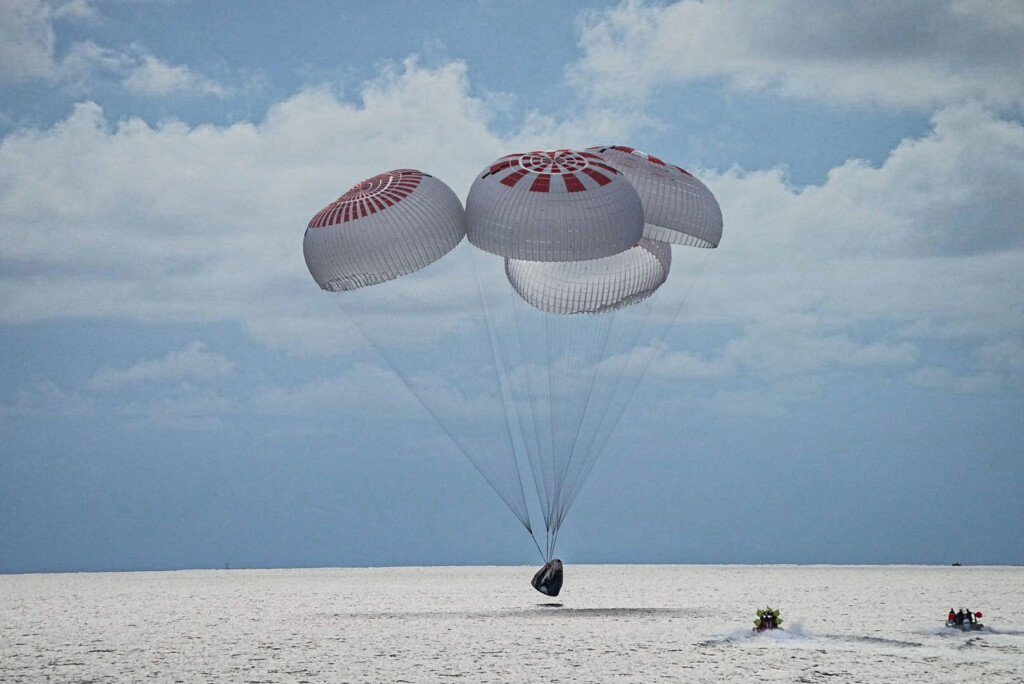

Since the turn of the millennium, there’s been a remarkable shift in humanity’s relationship with space. The once-exclusive domain of astronauts and researchers has begun to open its doors to a broader audience, starting a new era of exploration — space tourism.
Ever since the year 2000, space has been occupied by people — thanks to the crews up at the International Space Station. And more individuals are starting to seek journeys beyond our planet.
Beyond the excitement of embarking on such journeys, there is a new avenue of opportunity; it’s the one that appeals to investors seeking avenues of growth in the medium to long term. Here is a closer look into these paths.
The rise of space tourism

Space tourism is on the rise — in 2022, the industry was worth $695.1 million, and it’s expected to grow by 40.2% each year from 2023 to 2030. What’s driving this growth?
- Tech advances — Thanks to better rockets and spacecraft, the cost of space travel is dropping. This lets private companies join in, offering unique experiences.
- Adventure appeal — People love extraordinary experiences. Space offers a view of Earth like no other, along with weightlessness and spacewalks, alluring adventures for thrill-seekers.
- Wealthy explorers — Rich individuals interested in space are giving the industry a boost. They’re willing to pay more for an exclusive journey beyond the planet.
- Research push — Both governments and private groups are investing in space technology. This helps improve safety and comfort for space tourists and drives overall industry growth.
- Everyone’s invited — While traditional astronaut training requires extensive qualifications, space tourism endeavors are being designed to cater to non-professional astronauts.
- Innovation surge — New tech like reusable rockets is shaking up the space sector, which means more affordable trips to space more often.
Key segments for investment
In this segment, we’ll dive into sectors brimming with investment potential and spotlight companies making their mark.
Spacecraft manufacturers
In this segment, the best companies to invest in are Virgin Galactic and Blue Origin.
Virgin Galactic, publicly traded as SPCE, boasts its SpaceShipTwo spacecraft, which is accompanied by a jet-powered carrier aircraft, WhiteKnightTwo. After takeoff, the spacecraft is released and propelled by a rocket motor to reach an altitude of about 295,000 feet. Passengers experience microgravity as the spacecraft executes a slow backflip at the edge of space before gliding back to Earth. Virgin Galactic is pioneering reusability by replacing the rocket engine and reconnecting it to the carrier aircraft for subsequent flights.
Blue Origin, founded by Amazon’s Jeff Bezos, operates the New Shepard rocket. This more traditional rocket design involves a booster and a domed capsule. The booster and capsule separate after ascent, with the capsule reaching over 330,000 feet in altitude. After a few minutes of microgravity, the capsule returns to Earth using parachutes, while the booster lands separately for reuse in future missions.
Other notable players in the space tourism arena include Space Perspective, SpaceX, Boeing, and Zero2Infinity.
Space tourism operators
There is a lot of overlap between manufacturers and operators, so for the point of not repeating Virgin Galactic and Blue Origin, let’s talk about other prominent players in the space tourism industry.
Axiom Space stands as a multifaceted participant in the space tourism landscape. While its endeavors extend to constructing a commercial space station and contributing to NASA’s lunar spacesuit design, Axiom’s most prominent service is arranging private trips to the ISS. Access to the ISS for private clients now costs $55 million per person.
SpaceX has also been a key player in enabling private stays on the ISS. Collaborating with Axiom Space, SpaceX has chartered journeys for business executives to experience life on the ISS. Notably, SpaceX has also announced plans for a significant mission, aiming to send Japanese billionaire Yusaku Maezawa on a historic voyage around the moon.
Taking a distinctive approach, Worldview has priced its ticket at $50,000. Over a two-hour journey, passengers enjoy panoramic vistas from around 30 km above Earth before a gentle descent via a parasail.
The last operator, Rocket Lab, achieved a record-breaking nine successful launches in 2022. Analyst Kristine Liwag of Morgan Stanley aptly describes Rocket Lab as a “diamond in the rough,” highlighting its potential as an exciting investment opportunity within the evolving space industry.
Asteroid mining and resource utilization
Near-earth asteroids and the moon hold valuable resources like water and precious metals.
So, what is the best investment right now if you’re interested in this particular sector? The market is witnessing active engagement from such prominent players as Asteroid Mining Company, Bradford, iSpace, Kleos Space S.A., Planetary Resources, SpaceFab.US, Sierra Nevada Corporation, and Offworld. These companies are at the forefront of pioneering technologies and strategies to harness the resources present in space for various purposes, including fuel production and supporting sustained space exploration.
Factors influencing investment

These elements shape the industry’s direction for investors:
Technological advancements
Advancements in propulsion systems, spacecraft design, and cost-effective manufacturing processes directly impact the industry’s profitability and long-term viability. Investors should evaluate potential choices based on the companies’ strong commitment to research and development, as well as partnerships with cutting-edge technology firms.
Regulatory environment
As a potential investor, you should grasp the intricate regulatory framework governing space tourism. Regulations influence operational safety, licensing, and liability, which can significantly affect a company’s financial prospects. Savvy investors will also assess companies’ compliance strategies, their relationships with regulatory bodies, and their ability to adapt swiftly to changing requirements.
Public perception
Public sentiment wields considerable power in shaping investment landscapes. And if all goes well, positive public perception of space tourism can further fuel demand and investor interest.
Monitoring public opinion, media coverage, and social media discussions will give you insights into potential opportunities and risks. Companies that prioritize transparency, safety, and sustainable practices are likely to garner more favorable public sentiment, which translates into higher investor confidence.

The potential impact of new investment assets
New investment options in space tourism could change how people invest and influence the industry’s direction. For one, the space tourism sector is attracting attention from venture capital and private equity firms. In addition to injecting capital at crucial stages of development, VC and PE firms also offer strategic guidance, helping companies navigate challenges and capitalize on opportunities.
As the industry matures, established space tourism companies might opt for IPOs, which will allow them to raise substantial capital from the public markets. However, these opportunities may come with higher market volatility and the need to carefully analyze a company’s financial health and prospects.
Other interesting avenues for investments are ETFs, cryptocurrency, and tokenized assets. The former tracks the space tourism industry and offers investors exposure to a broad spectrum of companies involved in the sector. And the latter has the potential to enable fractional ownership and democratize access to space-related projects.
Anyway, the injection of capital through various investment channels will almost certainly accelerate the development of technologies and services. And these new assets allow investors to diversify their portfolios by tapping into a unique growth industry.
Risks and challenges
One major risk is the threat of space debris colliding with spacecraft, which requires operators to use shielding and detection systems. Human error is another concern, necessitating thorough training and clear procedures. Medical emergencies are also a risk due to extreme conditions, requiring well-prepared medical plans.
Technical challenges are also crucial considerations, especially when it comes to prioritizing creating safe and cost-effective spacecraft suitable for tourists. Establishing suitable launch sites with sufficient energy capabilities is also paramount, just like the development of space infrastructure to accommodate tourists. Lastly, reducing costs through technological advancements and reusing existing spacecraft is essential for profitability.
There’s a pressing need to address safety concerns for tourists and the absence of comprehensive compensation mechanisms, both of which raise ethical questions. With the environmental impact and fairness in accessibility, policymakers and industry leaders are tasked with finding delicate balances.
Conclusion

The landscape of space tourism investment is as diverse as the stars themselves. You have SpaceX, Blue Origin, Virgin Galactic, Rocket Lab, Boeing, Asteroid Mining Corporation, Kleos Space, and many more companies that can make good investments for 2023. However, just like any cosmic voyage, any speculative asset, or any new opportunity, space tourism investments come with their fair share of risks.
And speaking of new opportunities, if you’re considering venturing into these investment frontiers, keep an eye on Binomo. The platform has its finger on the pulse of emerging markets and industries, space tourism and its satellite industries may soon join the trading packages.
Sources:
Space tourism market size & growth report, 2023 – 2030, Grand View Research
Space tourism: the latest news, features and photos, Space.com
The future of space tourism is now. Well, not quite, The New York Times








